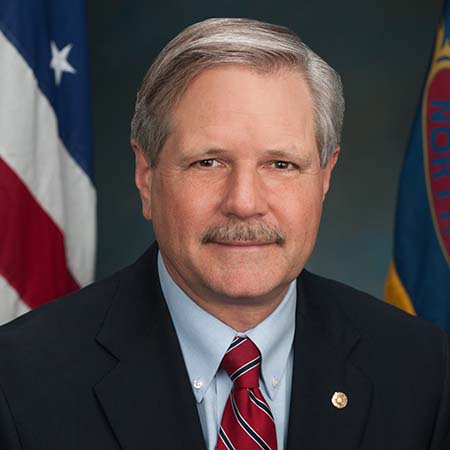A bill passed Thursday night by the U.S. Senate aims to help improve economic development activities in Indian Country.

The Indian Communities Economic Enhancement Act (Senate Bill 212), which Sen. John Hoeven, R-N.D. introduced in 2019, takes a three-pronged approach to economic improvement in Native communities.
The legislation “elevates and funds” the Office of Native American Business Development, expands application of the Buy Indian Act, and reauthorizes competitive grant programs under the Department of Health and Human Service’s Administration for Native Americans.
“The need for a comprehensive, tailored plan to help aid recovery and future economic development efforts is more important now than ever,” Chris James, president and CEO of the National Center for American Indian Enterprise Development, said in a statement. “This legislation will make it easier for Indian Country businesses to access capital, economic development opportunities, and procurement and other business assistance.”
Native American Financial Officers’ Association Executive Director Dante Desiderio called the legislation a “broad bill” that would shore up existing services and programs, as well as authorize studies on further improvements.
“We’re looking into the longstanding issues that have really held back economic development, from how we access capital to tourism,“ Desiderio said. “The way we look at it is a great guidance document we can use to study those issues and move Indian Country forward.”
The Office of Native American Business Development’s reorganization “elevates” the office to act as a liaison between federally recognized American Indian tribes and the Department of Commerce. The proposed legislation would authorize $2 million a year to fund the office permanently.
The goal is to strengthen the office’s ability to pull together federal agencies and departments toward “Indian community development initiatives,” such as promoting  Sen. John Hoeven, R-N.D.(Courtesy photo)investments in Indian Country, developing alternative collateral for financing, and potentially qualifying tribes as accredited investors through discussions with the U.S. Securities and Exchange Commission.
Sen. John Hoeven, R-N.D.(Courtesy photo)investments in Indian Country, developing alternative collateral for financing, and potentially qualifying tribes as accredited investors through discussions with the U.S. Securities and Exchange Commission.
The bill also could help to address the lack of access to capital in Native American communities. In a November address to the National Congress of American Indians, Lael Brainard, a member of the Federal Reserve’s Board of Governors, cited data that 16 percent of American Indians and Alaska Natives were “unbanked” as of 2019 and just one in three Native Americans had a strong or very strong relationship with a lender. That challenge stems in part from the comparative lack of bank branches in Indian Country, according to a previous Tribal Business News report.
Casey Lozar, vice president and director of the Center for Indian Country Development at the Federal Reserve Bank of Minneapolis, described access to capital as “chronically a challenge” in Indian Country, particularly for startup entrepreneurs.
Along those lines, the bill also contains a provision that should be especially helpful for Native community development financial institutions (CDFIs), many of which are on the frontlines of providing capital in Native American communities. The provision permanently removes a matching requirement for Native CDFIs to access money from a national CDFI fund.
Native CDFI Network Executive Director Jackson Brossy told Tribal Business News that removing the requirement should improve his members’ access to Treasury grants.
“The past several years, the Treasury has done their own waiver, but at an administrative level,” Brossy said. “We’ve been fortunate the Treasury has done that waiver, but there was the threat they might not, so by Congress stepping in and making that permanent, it provides certainty. That’s really helpful.”
The federal legislation also would require a Government Accountability Office assessment of the current suite of programs and services assisting Native communities with economic development. The study should bring to the forefront an array of challenges in Indian Country, such as in the implementation of the Paycheck Protection Program instituted earlier this year that largely exempted Native CDFIs, Brossy said.
“We think if the SBA and the Treasury had been talking that Native CDFIs wouldn’t have been cut out and kept out of the PPP and would have been able to lend in their communities,” he said. “We think those challenges would be highlighted in a GAO report. We think a GAO report would highlight the need for collaboration between agencies.”
Desiderio at NAFOA added that further relief for Native CDFIs and a more Native-accessible iteration of the Paycheck Protection Program was currently included in the discussions for a possible new round of coronavirus relief.
“The PPP is incredibly important for tribal communities. Those are the ones hit really hard,” Desiderio said. “We’re hoping to see more relief going to those CDFIs that provide loans to (Native) businesses.”
As well, the legislation also would expand the application of the Buy Indian program that encourages federal contractors to use Native services and products. A provision in the bill requires the Department of Health and Human Services to use Native labor and Native-made products for general contracts “unless Interior or HHS determines it would be impracticable and unreasonable to do so.”
“It’s again giving guidance that it’s really important to utilize Native American contracting as much as possible,” Desiderio said. “The idea is that they should be doing everything they can to contract with the tribes. It’s a push to get tribes access to contracts easier, or give agencies the idea they should be doing a lot more to reach out to tribes.”
While the bill passed the Senate in June 2019, it passed the U.S. House on Dec. 3 via voice vote with title change (marking the bill “of 2020” rather than “of 2019) which sent it back to the Senate. It passed Dec. 17 and now heads to President Trump.
In a statement emailed to Tribal Business News, Hoeven said: “We sponsored this legislation to provide regulatory relief and resources to better help Tribes attract investment, diversify their economies and create good jobs for their members.”
--
EDITOR’S NOTE: This story has been updated to reflect that the Senate passed the bill and to add comment from the National Center for American Indian Enterprise Development.
